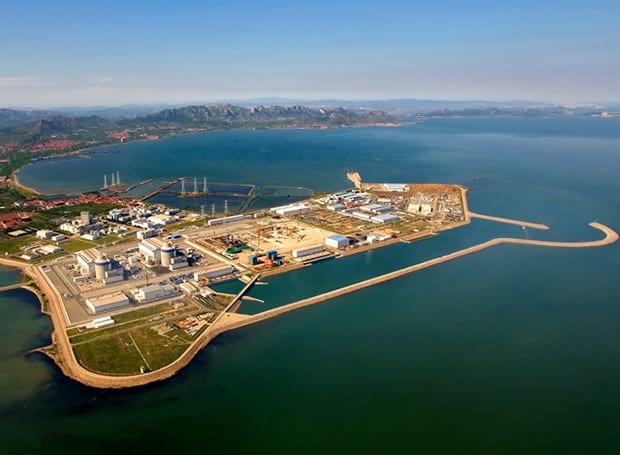Now Two AP1000 Reactors in Commercial Operation, Vogtle Makes Progress Too
Unit 1 at the Haiyang nuclear power plant in Shandong, China, successfully completed a 168-hour full-power continuous operation test, meeting the requirement for commercial operation, State Power Investment Corp. Ltd. announced on October 23. Its AP1000 reactor is the first nuclear unit to be placed in operation in Shandong, an eastern province on the Yellow Sea.
It became the second AP1000 to reach this critical milestone, joining Sanmen Unit 1, which achieved commercial operation in September. Other AP1000 units under construction include Sanmen 2, Haiyang 2, and Vogtle Units 3 and 4 in the U.S.
Of the Chinese units, Sanmen 1 was the first to begin construction, in April 2009; construction began on Haiyang 1 in September that year. Sanmen 1 achieved initial criticality on June 21 and was grid-connected on June 30. Haiyang 1 (Figure 1) achieved first criticality on August 8 and was connected to the grid on August 17. Sanmen 2 is expected to enter commercial operation by the end of 2018, while Haiyang 2 is expected to enter service early next year.
 |
| 1. Haiyang nuclear power plant in Shandong, China. Courtesy: State Power Investment Corp. Ltd. |
The AP1000 is Westinghouse Electric Co.’s latest pressurized water reactor design. Based on nearly 20 years of research and development, the AP1000 plant builds and improves upon the established technology of major components used in previous Westinghouse-designed plants. Simplification was said to be a major design objective for the AP1000 plant. Westinghouse claimed the design would save owners money with an accelerated construction time from the pouring of first concrete to the loading of fuel, making it easier and less expensive to build, operate, and maintain.
However, that has not proven to be the case. All of the AP1000 units have experienced delays and cost overruns, which led to Westinghouse filing for bankruptcy protection on March 29, 2017. Ultimately, two AP1000 units under construction in South Carolina at the V.C. Summer nuclear station, owned by SCANA Corp. and Santee Cooper, were abandoned due to high costs. The Vogtle project has faced similar trouble—some estimates suggest the cost to complete the two units will now exceed $27 billion—nonetheless, owners voted last month to continue the project.
Some recent success at the Vogtle site suggests builders may have turned a corner. On October 22, Georgia Power announced the placement of two key floor modules—referred to as CA35 and CA33—on Unit 4. The company said that would be followed by large concrete placements inside the unit’s containment vessel. Additionally, Georgia Power said the second of four reactor coolant pumps had been placed inside the Unit 3 containment vessel. The 375,000-pound pumps are mounted to the steam generator and serve as critical components in the reactor coolant system.
—Aaron Larson is POWER’s executive editor (@AaronL_Power, @POWERmagazine).
The post Now Two AP1000 Reactors in Commercial Operation, Vogtle Makes Progress Too appeared first on POWER Magazine.